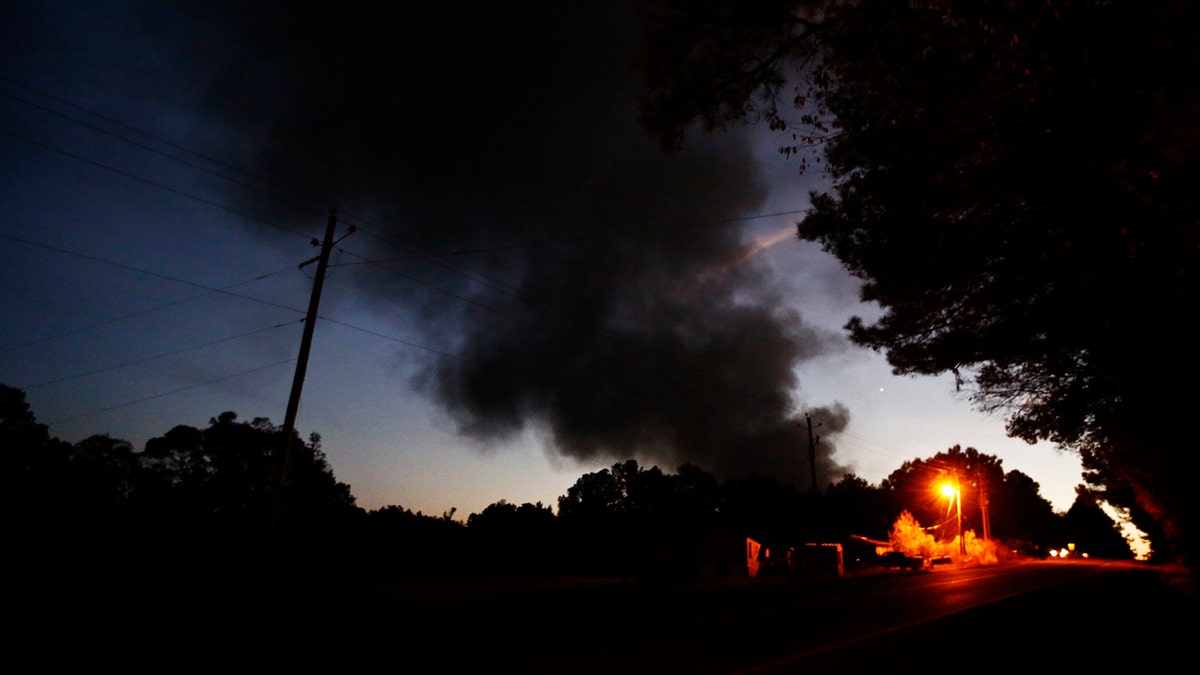
Light from a light pole shows a house near a plume of smoke from a Colonial Pipeline explosion, Monday, Oct. 31, 2016, in Helena, Ala. (Copyright 2016 The Associated Press. All rights reserved.)
Alabama Gov. Robert Bentley declared a state of emergency Tuesday after a gas pipeline explosion killed a worker, injured five others, and sent thick black smoke over a forest in the northern part of the state.
The blast on Monday shut down the pipeline that supplies gasoline to millions of people for the second time in less than two months, raising concerns over possible gas shortages and price hikes.
PIPELINE BLAST MAY CREATE 'EPIC PROBLEM' FOR DRIVERS
Bentley's action means that for the time being, truckers carrying gasoline won't be subject to the limits on hours they may drive that apply under normal circumstances.
Governors in other states took similar actions after a leak in the Colonial pipeline in Alabama last month led to gasoline shortages across the South, as trucks carrying gasoline help make up some of the shortfall caused by the closed pipeline.
Monday's explosion unfolded when a track hoe -- a machine used to remove dirt -- struck the pipeline, igniting gasoline.
Four of the injured remained hospitalized, Colonial spokesman Bill Barry said at a Tuesday afternoon news conference in nearby Helena, Alabama. He had no updates on their conditions or the severity of their injuries. Another worker was treated at the scene, Barry said.
The September leak that spilled 252,000 to 336,000 gallons of gasoline occurred not far from the location of Monday's explosion. That leak led to days of dry pumps and higher gas prices in Alabama, Georgia, Tennessee and the Carolinas while repairs were made.
NEARLY $1 MILLION POURS IN FOR ND ANTI-PIPELINE PROTEST, BUT IT MAY NOT LAST
The contractors were working on repairs related to the September leak when gasoline ignited and spread fire to the pipeline, the U.S. Pipeline and Hazardous Materials Safety Administration said Tuesday.
The nine-member crew was using the track hoe to excavate the pipeline as part of preparation work so that permanent repairs from the September leak could be made, Colonial Pipeline executive Gerald Beck said. The machine struck the pipeline, touching off the explosion, he said.
The Colonial pipeline provides nearly 40 percent of the region's gasoline and usually runs at or near full capacity. Together Colonial's two lines carry more than 2 million barrels of fuel a day.
By mid-day Tuesday, Colonial Pipeline said it was able to restart the second of its two main lines, which carries diesel fuel and jet fuel. However, the company added that it anticipates that the main gasoline line will be closed the rest of this week.
Colonial Pipeline, based in Alpharetta, Georgia, operates 5,599 miles of pipelines, transporting more than 100 million gallons daily of gasoline, jet fuel, home heating oil and other hazardous liquids in 13 states and the District of Columbia, according to company filings.
Plagued by a severe drought after weeks without rain, the section of the state where the explosion happened has been scarred by multiple wildfires in recent weeks, and crews worked to keep the blaze from spreading.
Coleen Vansant, a spokeswoman with the Alabama Forestry Commission, said crews built a 75-foot-long earthen dam to contain burning fuel. The Shelby County Sheriff's Office said the blaze had been contained but it was unclear how long the fire may take to burn out.
Two wildfires caused by the explosion burned 31 acres of land, Vansant said.
"We'll just hope and pray for the best," Gov. Robert Bentley said in a statement.
Houses around the blast scene were evacuated, and sheriff's Capt. Jeff Hartley said it wasn't clear when people might be able to return home.
Eight or nine subcontractors were working on the pipeline when it exploded about 3 p.m. Monday, sheriff's Maj. Ken Burchfield told Al.com. The conditions of those hurt weren't immediately known.
"Colonial's top priorities are the health and safety of the work crew on site and protection of the public," the company said in a brief statement.
In North Carolina, the governor and attorney general, who are political rivals, responded to worries about gasoline prices following the explosion. Attorney General Roy Cooper reminded residents that North Carolina's price gouging law remains in effect. Gov. Pat McCrory urged citizens not to participate in panic buying.
McCrory, a Republican, and Cooper, a Democrat, are rivals in the 2016 governor's race.
The Associated Press contributed to this report.





















